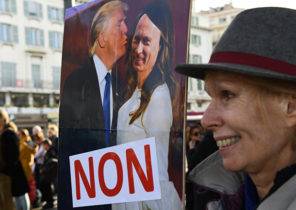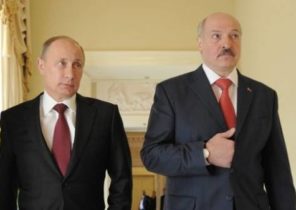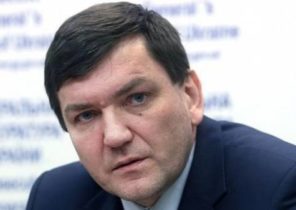The United States and Russia are heading for confrontation in the field of arms control, despite the fact that both governments focused on combating the spread of coronavirus.
Although the pandemic has forced Moscow and Washington to go on providing each other with medical aid, nuclear tensions between the United States and Russia continues to grow. Since China became a bone of contention between Moscow and Washington on arms control, some Russian experts predict that the Kremlin could take steps to strengthen cooperation with Beijing.
Last week the US state Department announced that the United States intends to withdraw from the Treaty on open skies within six months, accusing Russia of “blatant and ongoing” breach of this agreement. State Department officials noted that the United States can reconsider its decision, “if Russia return to compliance with the terms of this agreement in full”.
The Treaty on open skies, signed in 1992, gives the right 35 participating countries, including the United States and Russia to conduct observation flights over the territories of each other.
Russia rejected accusations that it had violated the terms of this agreement, and, in turn, has accused the United States in that they behave in a “dangerous and unpredictable” way. Meanwhile, Moscow has stressed that it will continue to comply with the terms of this agreement.
For Russia, the administration’s decision to trump to withdraw from the Treaty on open skies will not be a great loss, as said Victor murakhovski, chief editor of the influential Russian magazine “Arsenal Otechestva”.
He explained that since both Russia and the United States collect most of its intelligence from satellites, in terms of monitoring the territory of the United States Moscow has little to lose from the exit of Washington from the Treaty on open skies.
“I don’t think this decision will have any serious military consequences. However, this solution would entail political consequences, since failed another agreement aimed at reducing military threats and the strengthening of trust between Russia and the United States,” — said murakhovski.
Meanwhile, Moscow has much more pressing question is the fate of the new contract on reduction of offensive arms (start-III), which was signed by the United States and Russia in 2010 which has imposed restrictions on the number of strategic nuclear weapons, which the parties may have to deploy. The administration of the trump insists on the revision of the terms of this agreement and the inclusion of China, which, according to American intelligence, will double its nuclear Arsenal over the next decade.
Meanwhile, Beijing has repeatedly rejected the appeal of the property trump to sign a new tripartite agreement on arms control, indicating that China’s nuclear Arsenal with fewer than 300 nuclear warheads, much less arsenals of the United States and Russia, who will have about 6 thousand warheads.
Amid uncertainty surrounding the new contract on reduction of offensive arms, nuclear tensions between the United States and Russia starts to grow. In early February, the Pentagon announced that it has begun to deploy nuclear missiles of low power on submarines. The Ministry of foreign Affairs reacted by warning that any attack on Russia with the use of these missiles will be met with retaliatory nuclear strike.
Later in February, the Pentagon announced that military exercises, the us military has simulated the application of a limited nuclear strike on Russia. This statement caused outrage in Moscow, and the Ministry of foreign Affairs of Russia has accused Washington of conducting a “dangerous game.”
In April, trump was appointed special representative for arms control Marshall Billingsley (Marshall Billingslea), who previously held the position of assistant Secretary of the Treasury for the suppression of the financing of terrorism. Immediately after taking office, Billingsley chose a very harsh tone, warning that the United States is ready to destroy Russia and China in the case of a new arms race.
Although the Kremlin has admitted that Russia could not compete with the United States on the issue of defense spending, he promised to respond to the resumption of a military buildup by the United States. However, instead of expanding its nuclear Arsenal, the Russian leadership has concentrated on the development of new advanced weapons.
“Putin has said many times that we fail to be drawn into an arms race that bankrupted the Soviet Union. Instead, our response will be asymmetrical and targeted,” said Andranik Migranyan, a Professor at the Moscow Institute of international relations and informal adviser to the presidential administration.
“The United States defense budget exceeds $ 700 billion — Russia cannot allocate the same money on military spending, he continued. — So Russia will focus on the development of hypersonic missiles and other forms of deterrence, which will help to ensure an adequate response to American calls at a lower cost”.
Migranyan added that the United States in 2020 represent less terrifying threat compared to the United States in 1980. According to him, today America is too heavily mired in confrontations with other enemies to exert significant pressure on Russia. Migranyan noted that due to disputes of property trump traditional allies of the United States regarding trade and defense spending, the ability of Washington to challenge Russia or China is gradually weakening.
“If the administration trump comes into the fight all his potential opponents, saying at the same time all its potential allies to go to hell, United States find themselves in a less favourable position for total confrontation,” he said.
Meanwhile, although the administration trump is stepping up its pressure on Russia, she also hopes that the Kremlin will support the new agreement on arms control that would include China. Earlier in may, Billingsley said in an interview with the Washington Times that the United States is counting on Moscow’s help to bring China to the negotiating table, adding that Moscow itself has an interest in limiting China’s nuclear Arsenal.
But last week, in an interview with the Deputy Minister of foreign Affairs of Russia Sergey Ryabkov rejected the proposal, explicitly stating that Moscow will not stand on the side of Washington in its relations with Beijing.
“We have a strategic partnership with China, we appreciate him — said Ryabkov in an interview to the Russian newspaper “Kommersant”. — In conditions when the USA, in fact, the inability of a partner, a destroyer of the architecture of the entire system of arms control as we can for the sake of ephemeral advantages and benefits to build some kind of intrigue in this area?”
Even before the United States reported that they consider the possibility of entry of start III, Russia and China began to cooperate in the field of missile defense. In 2016, these two countries annually hold missile exercise. In October last year, the President of Russia Vladimir Putin has declared that Russia is helping China to develop its own early warning system of missile attacks — currently such systems are only in the United States and Russia.
According to Murakhovsky, if tensions between Russia and the United States in the field of arms control will continue to grow, this kind of cooperation between Moscow and Beijing will be expanded.
“If Russia and China are just beginning to share information collected by their early warning systems, both countries will be able to significantly strengthen its security, he explained. — In addition, China has more opportunities for response at sea, as the strength of its Navy is growing, while in Russia there is a more perfect system of air and missile defense.”
However, according to Migranyan, the geopolitical consequences of the collapse of start III can be much larger and more serious. He noted that, although not so long ago, a military Alliance between Russia and China was something unthinkable, now the parties are beginning to revise their long-standing concerns on this issue.
“It seems to me that the result of the desire of [the United States] to force China to capitulate to Beijing for the first time ready to go to the formation of very deep military ties with Russia, perhaps even of the Alliance, said Migranyan. — Neither China, nor Russia did not intend to go this route, but Washington’s policy leaves them no choice.”







